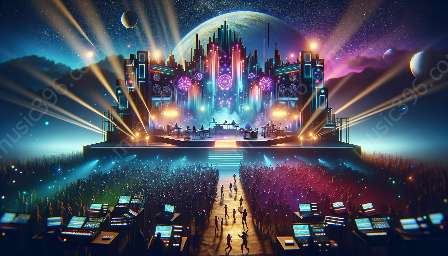Electronic music production for video games has seen several exciting trends in recent years, with the genre playing a crucial role in the overall gaming experience. As electronic music continues to evolve, its compatibility with video games has opened up new creative possibilities and enhanced the immersive nature of gaming experiences. In this article, we will explore the latest trends in electronic music production for video games, its impact, and its compatibility with the gaming industry.
Evolution of Electronic Music in Video Games
Electronic music has been a significant part of video game soundtracks since the early days of gaming. From the chiptune soundtracks of classic arcade games to the sophisticated electronic compositions in modern titles, the evolution of electronic music in video games has been remarkable. As technology has advanced, so has the complexity and diversity of electronic music in gaming, allowing for more dynamic and immersive soundscapes. The integration of electronic music in video games has become increasingly sophisticated, enhancing the storytelling, gameplay, and overall player experience.- Dynamic Soundtracks: One of the notable trends in electronic music production for video games is the rise of dynamic soundtracks. With advancements in audio technology and game design, developers can create adaptive music systems that respond to players' actions and the in-game environment. This trend has led to more interactive and responsive gaming experiences, where the music evolves in real-time based on the player's interactions, adding an extra layer of immersion and excitement to the gameplay.
- Cross-Genre Experimentation: Electronic music's flexibility and adaptability have allowed for cross-genre experimentation in video game soundtracks. From ambient electronic textures to high-tempo beats and bass-heavy tracks, electronic music has seamlessly blended with various musical styles and genres, reflecting the diverse settings and narratives of different games. This trend has expanded the sonic landscape of video game music, offering a rich tapestry of sound that resonates with players across different gaming experiences.
- Live Performances and Events: Electronic music in video games has transcended the game itself, leading to live performances and events centered around game soundtracks and electronic music productions. Gaming conventions, music festivals, and dedicated gaming events have featured live performances by electronic music artists, composers, and DJs, showcasing the widespread appeal and influence of video game music in the electronic music scene. This trend has not only elevated the status of video game music but has also forged a deeper connection between gaming culture and the electronic music community.
- Collaborative Compositions: Collaboration has become a prominent trend in electronic music production for video games. Game developers, music producers, and composers are increasingly joining forces to create original and compelling soundtracks that complement the narrative and gameplay mechanics of a game. This collaborative approach has resulted in innovative and emotionally impactful music that resonates with players, elevating the overall gaming experience and strengthening the bond between music and gaming.
Impact and Compatibility
The impact of electronic music on video games cannot be understated. Its compatibility with the gaming industry has resulted in several benefits and unique opportunities for both music producers and game developers. The immersive nature of electronic music, coupled with its adaptability and emotional resonance, has significantly enhanced the storytelling, gameplay dynamics, and overall atmosphere in video games. Here are some key aspects highlighting the impact and compatibility of electronic music in video games:- Emotional Resonance: Electronic music has the ability to evoke a wide range of emotions, from euphoria and excitement to tension and introspection. This emotional resonance is crucial in amplifying the narrative, character arcs, and pivotal moments in a game. Through carefully crafted compositions and sound design, electronic music can heighten the player's emotional engagement, creating memorable and impactful gaming experiences.
- Adaptive Atmospheres: The adaptability of electronic music lends itself to creating dynamic and immersive atmospheres in video games. Whether it's the pulsating rhythms of action sequences, the ethereal ambience of exploration, or the haunting melodies of suspenseful moments, electronic music can dynamically shape the player's experience, aligning the auditory landscape with the evolving gameplay scenarios. This adaptability adds depth and dimension to the game world, enriching the overall sensory experience.
- Cultural Connectivity: Electronic music's widespread popularity and cultural significance have established a strong connection with gaming culture. As electronic music continues to permeate mainstream media and entertainment, its presence in video games further solidifies its cultural relevance and appeal. This connectivity extends beyond gaming, influencing music enthusiasts, electronic music fans, and the broader entertainment industry, fostering a mutual exchange of creativity and inspiration.
- Creative Expression and Innovation: The compatibility of electronic music in video games has opened doors for creative expression and innovation. Music producers and composers have been able to push the boundaries of sound design, experimentation, and artistic storytelling through their contributions to video game soundtracks. In turn, game developers have leveraged the unique characteristics of electronic music to craft distinct auditory identities for their games, fostering a collaborative environment that fuels creativity and artistic exploration.
Conclusion
The evolution and impact of electronic music in video games continue to shape the landscape of gaming and music production. The latest trends in electronic music production for video games underscore the dynamic nature of this creative fusion, highlighting the ongoing innovation, collaboration, and cultural significance of electronic music in gaming. As electronic music and video games continue to intersect and evolve, their compatibility will undoubtedly lead to new creative horizons, immersive experiences, and memorable sonic landscapes, enriching the gaming industry and captivating audiences worldwide.


